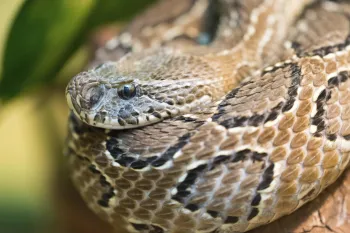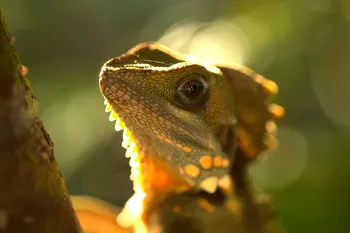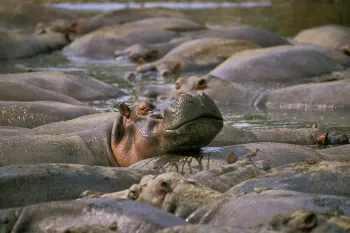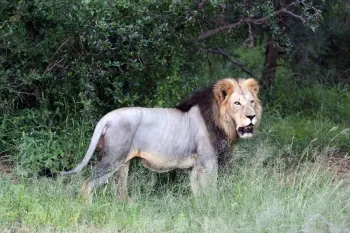Brussels/Munich—The European Union remains a main hub and destination for wildlife ‘stolen’ from the Americas, Africa, Eastern Europe, Asia and Oceania.
The new report released today by Pro Wildlife, Humane World for Animals, International Fund for Animal Welfare, FOUR PAWS and Wildlife Conservation Society, makes the case for stricter laws and the closure of serious legal loopholes. Stolen Wildlife: The EU’s role as destination for wildlife traffickers – an update, shows how the EU is driving the demand for this illegal trade. The captive wildlife trade involves the smuggling of species from all over the world, including those that are nationally protected in their country of origin.
EU legislative gaps fuel wildlife crime
The European Union is one of the world’s biggest importers of wildlife. Only a small proportion of species traded are covered by international and/or EU legislation; yet many wild species being traded in the EU are protected under domestic legislation. These species are often caught in the wild and exported from their country of origin in violation of national law. The unique giant bronze gecko from the Seychelles and the Macedonian grayling from North Macedonia—Europe’s most threatened butterfly—are just two of the species impacted by this form of wildlife trafficking.
Dr Sandra Altherr, head of science at Pro Wildlife, says: “Wildlife smugglers are openly selling illegally acquired animals within the EU in the full knowledge that they can get away with it because of existing loopholes in the EU legislation. Unscrupulous criminals can make big money without taking any significant legal risks. And it’s the global biodiversity that pays the price for this.”
Ilaria Di Silvestre, director of policy and advocacy for Europe at IFAW adds: “The Internet has a key role in this business by directly connecting traders and clients from all over the world, 24 hours per day, 7 days a week. The poorly regulated online trade of protected species poses a huge challenge for enforcement authorities. Illegal wildlife trade is dynamic, with illegally sourced species readily sold online and in high demand with European collectors and pet owners. These legislation loopholes make unaware online users complicit in trafficking.”
Closure of legal loopholes is overdue
Dr Joanna Swabe, senior director of public affairs for Humane World for Animals Europe, formerly known as Humane Society International, points out: “Five years ago, the European Commission promised to crack down on illegal wildlife trade in its Biodiversity Strategy to 2030, yet—as our report illustrates—the illegal wildlife trade continues to flourish. It is high time for the Commission to turn these words into action by developing supplementary legislation to criminalise the trade in wildlife taken in violation of the laws of non-EU countries.”
Aubrey Collins, EU wild animal policy specialist at FOUR PAWS and international wildlife lawyer, refers to the results of a study commissioned by the European Commission on Criminalisation of Illegally Sourced Wildlife Trade: “This study confirms what legal researchers and experts have been saying for years, the criminalization of nationally protected species does not require courts to apply foreign law. Those engaging in illegal trade are getting more clever in which species they target, it is time EU laws catch up to current trends.”
Global theft for the EU market
The new Stolen Wildlife report presents case studies from 17 countries, illustrating the global trafficking operations that cater to clients in the EU. It reinforces reports from EUROPOL and the latest World Wildlife Crime Report by the UN Office on Drugs and Crime (UNODC) on the growth of this business model among wildlife smugglers.
The report comes at a pivotal moment, as UN Member States discuss the need for and feasibility of any new protocols to the UN Convention Against Transnational Organized Crime, expected to cover wildlife trafficking. A dedicated UNTOC protocol would be the first-ever international agreement focusing on wildlife trafficking and other forms of environmental crime, such as illegal logging, fishing and mining.
Given the EU’s central role, Alice Pasqualato, Global Policy Specialist on Environmental Crime at the Wildlife Conservation Society highlights: “The EU has a twofold role to play: closing the loopholes in its own legislation and seizing a once-in-a-generation chance to support the first global agreement against wildlife trafficking. EU consumers must be able to trust the legal origin of wildlife products entering the single market, and to be assured they are not inadvertently financing criminal activity.”
The new Stolen Wildlife report not only provides detailed case studies from different geographical regions; it also gives an overview of the attempts made by range States to protect their own unique biodiversity. These include recent successes in seizures and arrests in various countries, and formal proposals submitted to the upcoming CITES Conference of the Parties in Uzbekistan (24 Nov. to 5 Dec. 2025) to restrict international trade in endemic species.
The five organisations are calling for the EU to take prompt legislative action to introduce supplementary legislation to close the loopholes in the current EU Wildlife Trade Regulations by prohibiting the import, sale, purchase and possession of wild animals illegally obtained in their countries of origin. Moreover, these organisations urge the EU to support the conservation proposals of countries affected by this form of wildlife trafficking at the upcoming CITES conference.
#



